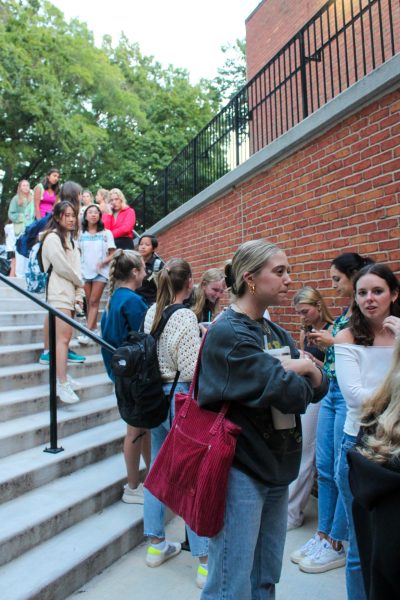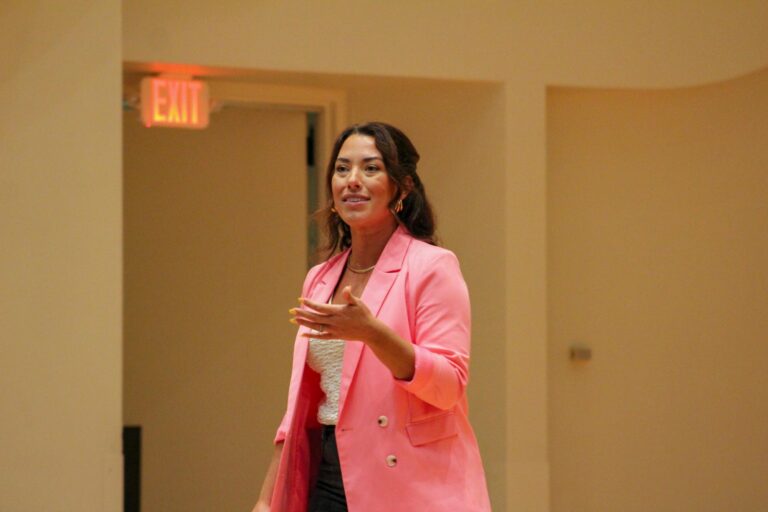The Wake Forest Panhellenic Council hosted a mandatory conference Monday with sexual violence educator and speaker Bonny Shade. The event drew criticism from some Panhellenic members due to its mandatory nature, lack of space for the event, and lack of Interfraternity Council (IFC) chapters.
“I need you to show up and care about this topic differently than ever before,” Shade told the crowd of nearly 600 female undergraduates gathered at Brendle Recital Hall on September 18. “I heard rumblings in the streets. — why do we have to go there? Where are the men ? Can I be excused? »
According to her websiteShade “changes the lives of student leaders and professionals through in-depth lectures, workshops, personalized curriculum and education.”
She has a leadership certificate in “Design Thinking”, a human-centered problem-solving approach. She has won numerous awards from international and national organizations for her work with fraternity and sorority members and students, focusing on holistic development.
Story continues below advertisement
During the event, Shade shared her own experience with sexual violence, statistics about high rates of violence in Greek life, the spectrum of sexual violence, and concrete ways to intervene.
Panhellenic Council President Sarah Haugh called the event vital and empowering for women in Panhellenic chapters.
“I think we have an obligation to talk about difficult topics and work to create a safe environment for everyone on campus,” Haugh said. “I think talking about it and understanding how we can better support each other as women, in the different spaces that we choose to be involved in, is really important.”
I believe we have an obligation to talk about difficult topics and work to create a safe environment for everyone on campus.
— Sarah Haugh, WFU Panhellenic President
In the 2023 Campus Climate Surveycommissioned by Wake Forest at the request of student government to address concerns about sexual misconduct, nearly 70 percent of female students surveyed reported experiencing sexual harassment — the highest rate of any group on campus.
Respondents also reported high levels of awareness of campus resources and high levels of prior sexual assault prevention training from the survey.
Despite the fact that sorority members appreciated the speaker, the event as a whole was met with negative reactions.
Some Panhellenic members have expressed frustration with the mandatory attendance policy and excuse system. The only way to be excused from the event was to submit proof of a scheduling conflict due to work or classes, or to email their chapter president and vice president of the responsibility of the CC Panhellenic Council, Harriet Middleton, with an explanation of how the conversation would take place. you feel “in danger”.
The Panhellenic Council promised confidentiality and emphasized the difference between feeling “uncomfortable” and feeling “unsafe” due to personal experience regarding the speaker’s content. Still, Panhellenic leaders said audience members were free to leave the event at any time if they felt “unsafe.”
When this mandatory requirement was met with backlash from sorority members on campus – concerned about privacy and sensitivity – the Panhellenic Council and chapters clarified that members were not required to share details in their emails , apart from the fact that they did not feel “in danger”.
“Even though it was after the deadline, every person who submitted an excuse that they were unsafe (was) excused,” Middleton said. “No exception to that.”

Additionally, approximately 200 members of the Panhellenic sections ended up being excused due to lack of seating in the Brendle Recital Hall. Members who were part of the overflow had their student IDs scanned and were marked as present, then excused to leave.
“I was embarrassed by the way the event was planned and executed. I felt the lack of planning on such an important topic was inexcusable and took away from the message,” said the president of a Panhellenic chapter, who was granted anonymity by Old Gold & Black due to concerns about repercussions. possible from the Panhellenic Council.
In addition to the participation policy, another source of criticism stemmed from the fact that IFC chapter members were not required to attend the Shade discussion and had not planned a comparable event themselves. This sparked controversy among the sorority’s members, who make up the majority of undergraduate women.
“I think Bonny was a great speaker and it was a valuable experience,” said attendee Anna Wexler. “However, I can’t help but wonder why we are still discussing ways for women to avoid being assaulted rather than trying to change the behavior of male perpetrators of sexual assault.”
Other members from different chapters echoed this grievance.
“There needs to be a conversation on both sides about consent,” said Panhellenic member Alyssa Eaton. “Not just one or the other.”
Haugh agreed with this sentiment, but further explained that Shade’s event was specifically designed to show women how to support other women. Haugh claimed that having men in the audience would change the atmosphere in a negative way.
“If you have 300 men sitting in the back of the room, you don’t know who they are, you don’t know what they’re thinking,” Haugh said. “It’s a community that you’re not involved in – and all of a sudden the conversation becomes very different.”
Haugh explained how the Panhellenic Council’s identity as an all-women community lends itself to prioritizing events aimed at preventing sexual assault.
“(The Panhellenic Council) is in a slightly different boat (than the IFC), because in many ways this is happening to us,” Haugh said. “I think it invites a different response in terms of how a community views it, if that makes sense.”
IFC assured that the issue of sexual violence was also one of its biggest concerns. In an email to the Old Gold & Black, IFC President Emory Horton wrote that “the sexual conduct and mental health of men at Wake are currently the two most urgent and relevant priorities of the IFC”.
Horton also said IFC has two events planned for IFC Week, October 29-November 29. 4, which directly cover issues related to consent and sexual assault. He reiterated the need for cultural changes within the Wake Forest community.
“Our approach to the issue of sexual misconduct is a response to the current campus climate; Female members of our community often do not feel comfortable in social situations,” Horton told the Old Gold & Black. “We decided to create intentional educational programs this fall to challenge this culture. »
When asked by Old Gold & Black about the IFC’s involvement in the September 18 event, Shade reaffirmed the Panhellenic Council’s decision.
If men want to have this type of conversation, they can schedule it.
—Bonny Shade
“I think it’s very powerful that the Panhellenic Executive Council organized this event specifically for women because they didn’t want to have to worry about planning for men,” Shade said. “If men want to have this type of conversation, they can schedule it. This conversation was specifically for women for these reasons.
Shade said she would be willing to return to campus and speak again to the Panhellenic Council, IFC or both organizations, as long as her message is delivered in a positive way. When asked about having a joint conversation in the future, Haugh remained optimistic, but said she believed there was still a plethora of separate work to be done.
“I really think it would be beneficial to open this conversation with IFC, to encourage more honest communication between the two boards,” Haugh said. “I think both of us as boards need to start having those honest conversations with ourselves before we can get to a point where it makes sense to have that with each other.”


